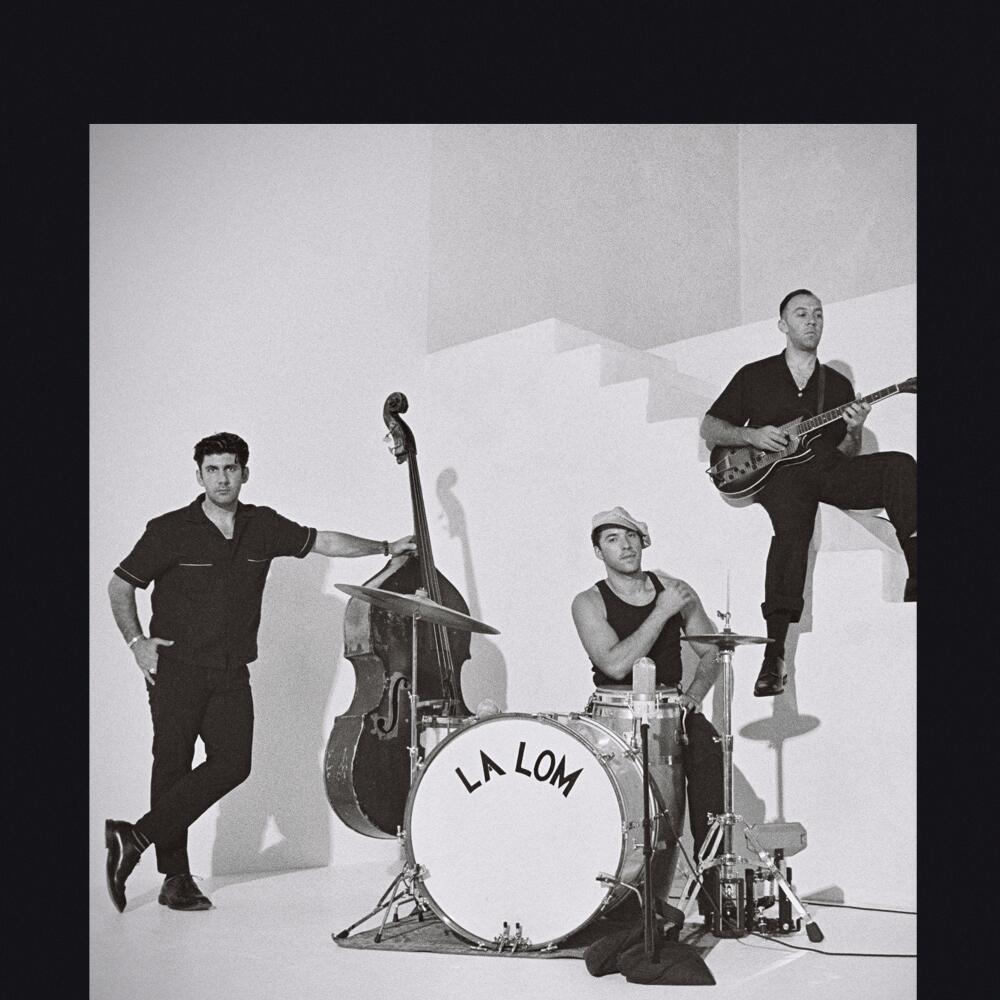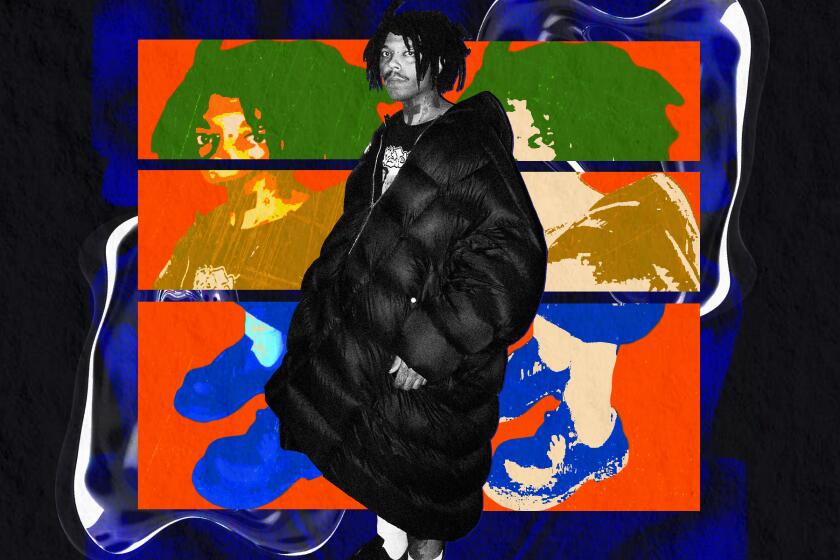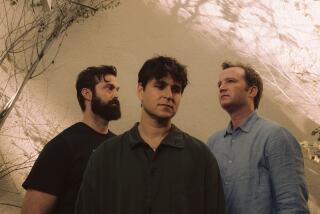
Dating back to 1927, the historic Roosevelt Hotel still maintains its old Hollywood charm. An antique-looking chandelier hangs from the patterned ceiling of the lobby, shining a soft yellow light onto a collection of colorful velvet seats and an indoor fountain. A few palm trees fill the space.
And for the better part of six years, La Lom has been using the adorned space to entertain hotel guests and Angelenos alike.
Estevie spent her early teenage years as a singing show contestant. Now, she’s ready to take over the world with her brand of cumbia pop.
The band — composed of guitarist Zac Sokolow, bassist Jake Faulkner and percussionist Nicholas Baker — was initially hired to be a part of the hotel’s immersive environment. The bandmates saw the job as just another source of income, but quickly realized it was a great space for the instrumental group to develop and fine-tune their sound.
La Lom stands for “Los Angeles League of Musicians” (it’s pronounced “La Loma,” like the bulldozed Chavez Ravine neighborhood that sat where Dodger Stadium is now), a tribute to the city’s influence on their music. The band plays a boisterous blend of Latin music and classic folk, and has released several EPs and covers. On Aug. 9, La Lom will release its self-titled debut album via Verve Records.
“When I first joined the gig, I had all these covers in mind to play, which were a lot of ‘60s pop and soul tunes,” said Sokolow. “I worked out arrangements where I was playing the melody on the guitar since there’s no singer.”
Sokolow and Faulkner began playing at the Roosevelt in 2018 and were accompanied by a rotating group of musicians for the first few months. Their early performances mostly consisted of mellow yet soulful instrumental covers of Roy Orbison, Sam Cooke and Aretha Franklin.
After Baker, Faulkner’s college friend, began playing with the duo on a consistent basis, he decided to bring his congas — an instrument he had played since childhood. The introduction of the Cuban hand drum changed everything.
“When I was a kid, my dad gave me a Trio Los Panchos album. I learned how to play a lot of those requinto parts when I was just starting on the guitar. So when Nick brought his congas in, we thought, ‘Oh, let’s try some of these out,’” said Sokolow.
Experimental pop artist Jean Dawson has recorded much of his music in English. With ‘Divino Desmadre,’ he’s tapping into his love language.
As they began to experiment, the vibe at the Roosevelt lobby began to shift. The once chill atmosphere became more uptempo. La Lom started infusing the lively sounds of cumbias and the romantic feel of boleros to its previously melodic, Americana style of music.
Coming from families that embraced music and the arts, each member brings various influences to the table. Sokolow grew up playing a lot of country and bluegrass, spending his childhood busking with his fiddle. Baker’s upbringing was full of Latin music — his grandmother is from Durango, Mexico, and was a popular host at a Spanish radio station in Tucson. Faulkner picked up his dad’s guitar and learned everything he could from “stoner beach people” while growing up in Venice.
“We noticed that no matter what we’re playing, there was always kind of this cohesiveness. Once it goes through the filter of our instrumentation and the way we play, it always sounds cohesive,” said Faulkner.
“It always just sounded like us,” Baker said. “We have a really good idea of what we do and we’re all very clear on what we like and don’t like. We all grew up with a lot of different kinds of music just from different influences around us that we grew up with. So, there’s an open-mindedness.”
Their hodgepodge of influences gave way to jazz-like improvisation. Over the course of their three-hour set, they often tried out new chord combinations and incorporated more requinto-style melodies. With each performance, they felt their sonic identity take shape. Hotel guests took notice and began to dance while they played. The three musicians had become the focus of the lobby, rather than just another fixture.
“We built up a really good repertoire and started to sound like a real band,” said Faulkner.
There were days when the band would travel from gig to gig, sometimes playing around nine hours of music a day. Each set was different. Occasionally they changed the arrangement of a cover song. Other times, their sets would be free-form, or they’d take requests from the crowd.
In 2021, they decided to make the band official by releasing a self-titled EP and posting videos of their performances online. One night, they were set to perform at a bar in Atwater Village. They thought of the performance as any other gig, but the size of the crowd begged to differ. They continued making their rounds through L.A.’s nightlife, eventually selling out Zebulon in Frogtown and the Lodge Room in Highland Park.
Utilizing styles from their upbringing and from decades they admire, La Lom’s vast understanding of music history plays a key role in how the band layers its rhythms and melodies. Tracks off “Angels Point & Figueroa,” its 2023 EP, are simultaneously referential and inventive. The song “Angels Point” opens with a guitar riff reminiscent of both an electric Peruvian chicha and Southern California surf rock On “Figueroa,” Faulkner’s bass line resembles one of a cumbia sonidera — striking, yet steady. Sokolow’s guitar brings more of a western, bluegrass feel where Baker’s Latin rhythms remain soft and echoey.
Transcending time periods and genres allows the trio to pull freely from their inspirations and create a sound they find to be uniquely Los Angeles. Almost all of their song titles are dedicated to various regions or locations in Los Angeles. Their initial 2022 EP featured tracks like the smooth, mysterious-sounding “Santee Alley.” “Cafe Tropical” has a calmer, harmonious quality to it.
“The music always comes first. We think about what this song makes us feel. What area does it vibe with in L.A.?” said Baker.
“The first one that we did like that was ‘Alvarado.’ I remember just thinking it was funny because it reminded me of ‘Corcovado’ [a bossa nova song written by Antônio Carlos Jobim in the 1960s]. I thought it was funny to have our own,” said Sokolow.
Beyond tying tracks to areas of the city, they find their sound to be a reflection of the diverse music found in it.
“I don’t feel at all like I’m playing somebody else’s music. This is the music of L.A.,” said Baker.
Recording its first studio album was a new challenge for La Lom. With the help of producer Elliot Bergman, the band members were able to translate the feeling of their live performances by embracing the studio as an additional instrument.
“A lot of these songs came from playing live in front of people. We were able to mess around in the studio more and expand the sound bigger than we perform live,” said Faulkner. “We overdubbed a lot of stuff, so we have an organ and different sound effects. Nick did some additional percussion, and we had some other musicians come in to play piano or steel. It really pushed us along.”
Beginning Thursday, La Lom will be opening for Vampire Weekend for four shows across the Southwest, and will spend the remainder of the summer performing at jazz festivals all over the U.S., Canada and the U.K.
“We are just doing what we wanna do. It feels kind of inclusive. The people who come to our shows feel like they’re a part of what we’re trying to share with them. We are translating to audiences in a way that a lot of cumbia bands can’t because there’s no language barrier,” said Baker.
“It’s just these wonderful melodies and good rhythms,” added Sokolow.
More to Read
The Latinx experience chronicled
Get the Latinx Files newsletter for stories that capture the multitudes within our communities.
You may occasionally receive promotional content from the Los Angeles Times.









